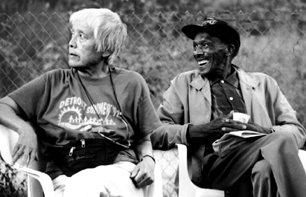I watched Parvez Sharma's movie, "A Jihad for Love" a second time last night. It is a very deep and touching movie about queer Muslims and their struggles. All who haven't seen it should try to. For folks in Seattle, please see below for more information on the movie's screening.
One thing that stood out to me about the documentary, is how resoundingly different Parvez Sharma's film is, from Irshad Manji's rhetoric. For all who don't know about Irshad, she is a self-identified queer Muslim woman who wrote a book called "The Trouble with Islam Today." One of her chapters is entitled "Thank God for the West." I mean, need I say more about this person? To add fuel to fire, she produced an hour long documentary about Islam and women (yes, you know what to expect...) which attempted to generalize the form of Islam that was practiced in Yemen, to the entire Muslim world. There was also the usual diss on the niqab as symbolic of the degeneracy of Muslim women. In the film, she portrayed Islam and Yemeni Muslims as a backward people, who, god forbid, use weapons (knives) from the 7th century ( I think "the West" similarly uses such barbaric weapons) . She is a pundit for the Western imperialist agenda that seeks to justify its take-over of the Middle East as some form of liberatory, benevolent form of aid to Muslim women.
Contrast Irshad Manji's depiction of most of the Muslim world (read, non-Western) as inherently patriarchal needing Western tutelage, to Sharma's depiction of queer Muslim folks in the Middle East and India. Unlike Manji, Sharma shows a broad array of theological interpretation of the Koran that everyday queer Muslims have undertaken. He shows the resilient attempts of many people to reconcile their faith in Islam and their sexuality.On the extreme end of the spectrum, there was Iram, a Morroccan French woman, who despite being in a lesbian relationship, was unable to see herself as a true follower of God. Then there was Sana, an African emigre to France who had undergone genital mutilation in her home country. Unlike Iram, Sana saw her love for women as a pure act, which could not possibly be sinful because she "caused no harm, only loved." Sana explains the cruel act of genital mutilation as a humanly misinterpretation and distortion of Islam, not something inherent in Islam that cannot be changed.
One of the most engaging characters was Mazan, an Egyptian gay man who had been part of the Cairo 52 incident. Cairo 52 was a case in Egypt in 2001, when the police raided a gay bar and arrested its patrons. Mazan was one of those arrested and was raped in prison. In the movie, he had a sense that God created human beings in the best of forms. Since he and many others were gay and a creation of God, they could not be abnormal or sinful. Mazan;s character was engaging in particular because his love and nostalgia for his country came through so strongly. Mazan, like the Iranian characters in the movie who similarly escaped their homeland out of fear, did not disown his homeland. It was a bittersweet moment watching these characters speak of their homes and the people whom they left behind. It was sad in that it really reflects the injustice of the hetersexist state policies of their countries, but also beautiful in that it counters the typical Western imperialist narrative that everyone in the Third World is so enamored with the freedoms of the West that they willingly chuck off every bit of their history and tradition to become part of the enlightenment project.
The film ends on two very inspirational notes. First, is when Sharma refers back to the title of the movie: Jihad for Love. Often, says Muhsin Hendricks, a gay South African imam, Allah has been characterized as Taqwa Allah, fearful and judgmental. However, Hendricks says, Allah is also the Allah of Love, and urges the audience to not despair of the mercy of God, because God is most merciful.
The film ends on the theme of ijtihad. Hendricks is reinvited back to the madrassa that he had been kicked out of when he came out, and speaks on the theological basis of homosexuality to a group of fellow Muslims. An elderly woman shows a lot of openness to his argument, and reminds the others that Islam commands eac h man and woman to learn for themselves and to challenge the status quo. She emphasizes thatthere is space within Islam for independent thinking, and as Muslims, they should apply this principle to orthodox Islamic thinking itself.
Lastly, what was great about the film too, is how it reclaims homosexuality for the Muslim world. Various characters, ranging from Sufi Muslims in Turkey, to Muslims in Pakistan, speak about how love between men were celebrated in Islam. From the poet Rumi, to Shah Hussein, great saints in the Muslim tradition have openly expressed homosexual love.
I have some minor criticisms of the film. Mainly that even though it shows the variety of experiences that Muslims undergo, it is focused solely on religious, practising Muslims. It doesnt highlight at any point, the experiences that secular Muslim folks have to undergo as they negotiate their sexuality. The argument is often made in people of color communities, that queer sexuality is a product of Western degeneration. I would have wished for the director to portray more of how queer folks engage with that judgment of them.
For folks in Seattle interested in watching the film. It will be screening at Varsity Theatre in the U-district all of this upcoming week. Also, Tasveer, the South Asian Independent Film Festival will be hosting Parvez Sharma on Sept 27th!
Here's the trailer:
Subscribe to:
Post Comments (Atom)





No comments:
Post a Comment